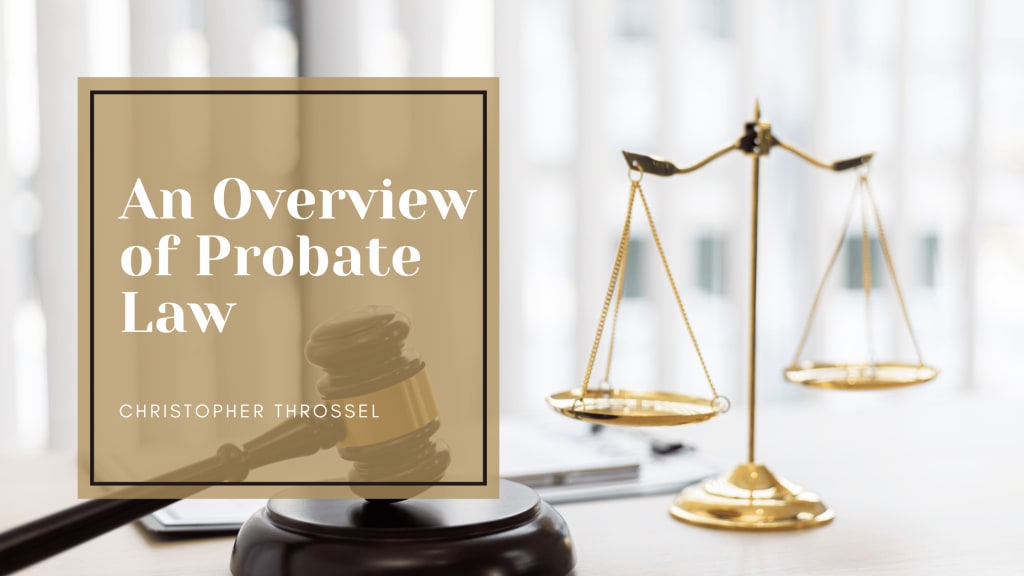An Overview of Probate Law
Christopher Throssel explains the basics of probate law

Probate is the legal process by which a person's estate is distributed after they pass away. This process involves verifying the validity of the deceased person's will, paying off their debts and taxes, and distributing the remaining assets to their heirs. While probate laws may vary by state, this article will provide a general overview of the probate process and its legal requirements.
Probate Process
The probate process usually begins with filing a petition in the probate court in the jurisdiction where the deceased person lived. The petition typically includes the original will, if there is one, and a list of the deceased person's assets and liabilities.
The court will then appoint an executor or personal representative to administer the estate. This person is responsible for managing the deceased person's assets, paying off their debts and taxes, and distributing the remaining assets to their heirs.
The executor's duties may include notifying creditors of the deceased person's death, collecting and managing their assets, filing tax returns, and distributing assets to the heirs according to the terms of the will or state law. If there is no will, the assets will be distributed according to state law.
Legal Requirements
Probate law requires that the deceased person's will be valid for it to be enforced. A will must be in writing, signed by the deceased person, and witnessed by at least two individuals who are not beneficiaries of the will. The will must also be made voluntarily and without undue influence from others.
If there is no valid will, the probate court will distribute the assets according to state law. This is known as intestate succession. The laws of each state may vary, but generally, the assets will be distributed to the deceased person's closest living relatives, such as their spouse, children, parents, or siblings.
Probate law also requires the deceased person's debts and taxes to be paid before any assets are distributed to the heirs. This may involve selling assets or using funds from the estate to pay off outstanding debts.
Probate Alternatives
While probate is a typical process, there are alternatives available to avoid or minimize the need for probate. One popular alternative is to create a living trust, which allows the deceased person's assets to be managed and distributed without going through probate.
Another option is to name beneficiaries for certain assets, such as life insurance policies or retirement accounts. These assets can be distributed directly to the named beneficiaries without going through probate.
Conclusion
Probate is a legal process that is designed to ensure that a deceased person's assets are distributed in accordance with their wishes or state law. While the probate process may vary by state, it typically involves verifying the validity of the deceased person's will, paying off their debts and taxes, and distributing the remaining assets to their heirs.
It is important to consult with an experienced probate attorney to ensure that the probate process is completed correctly and efficiently. Additionally, there are alternative methods available to minimize the need for probate, such as creating a living trust or naming beneficiaries for certain assets.
In addition to legal advice, working with a financial advisor or accountant may be helpful to ensure that the deceased person's debts and taxes are correctly managed and paid. By working with a team of professionals, you can help ensure that the probate process is completed efficiently and effectively.
Probate law can be complex and overwhelming, but it is possible to navigate with the proper support and guidance. Whether you are creating a will, managing an estate, or inheriting assets, it is vital to have a basic understanding of probate law and the options available to you.
In conclusion, probate law is a necessary legal process that ensures that a deceased person's assets are distributed in accordance with their wishes or state law. While the process can be complex and overwhelming, there are alternatives available to avoid or minimize the need for probate.
About the Creator
Christopher Throssel
Christopher Throssel is a licensed attorney in Fort Collins, CO. He is a Roger Williams University School of Law graduate and is dedicated to professionalism and approachability in his work.






Comments
There are no comments for this story
Be the first to respond and start the conversation.